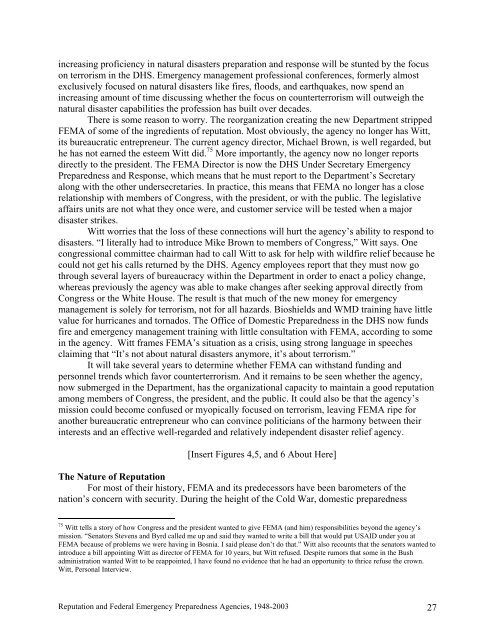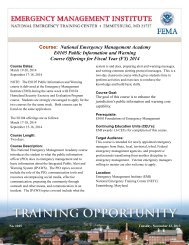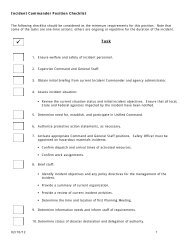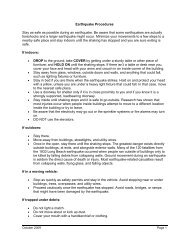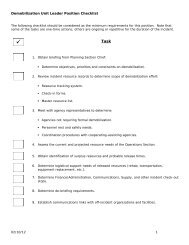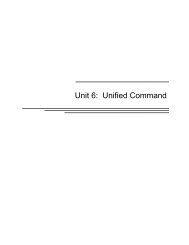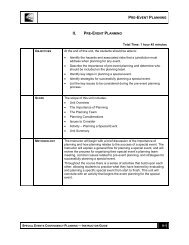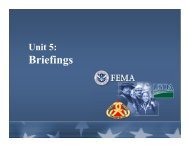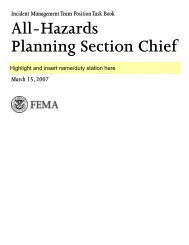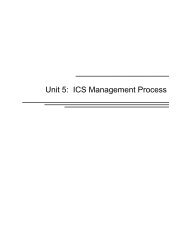Reputation and Federal Emergency Preparedness Agencies, 1948
Reputation and Federal Emergency Preparedness Agencies, 1948
Reputation and Federal Emergency Preparedness Agencies, 1948
You also want an ePaper? Increase the reach of your titles
YUMPU automatically turns print PDFs into web optimized ePapers that Google loves.
increasing proficiency in natural disasters preparation <strong>and</strong> response will be stunted by the focus<br />
on terrorism in the DHS. <strong>Emergency</strong> management professional conferences, formerly almost<br />
exclusively focused on natural disasters like fires, floods, <strong>and</strong> earthquakes, now spend an<br />
increasing amount of time discussing whether the focus on counterterrorism will outweigh the<br />
natural disaster capabilities the profession has built over decades.<br />
There is some reason to worry. The reorganization creating the new Department stripped<br />
FEMA of some of the ingredients of reputation. Most obviously, the agency no longer has Witt,<br />
its bureaucratic entrepreneur. The current agency director, Michael Brown, is well regarded, but<br />
he has not earned the esteem Witt did. 75 More importantly, the agency now no longer reports<br />
directly to the president. The FEMA Director is now the DHS Under Secretary <strong>Emergency</strong><br />
<strong>Preparedness</strong> <strong>and</strong> Response, which means that he must report to the Department’s Secretary<br />
along with the other undersecretaries. In practice, this means that FEMA no longer has a close<br />
relationship with members of Congress, with the president, or with the public. The legislative<br />
affairs units are not what they once were, <strong>and</strong> customer service will be tested when a major<br />
disaster strikes.<br />
Witt worries that the loss of these connections will hurt the agency’s ability to respond to<br />
disasters. “I literally had to introduce Mike Brown to members of Congress,” Witt says. One<br />
congressional committee chairman had to call Witt to ask for help with wildfire relief because he<br />
could not get his calls returned by the DHS. Agency employees report that they must now go<br />
through several layers of bureaucracy within the Department in order to enact a policy change,<br />
whereas previously the agency was able to make changes after seeking approval directly from<br />
Congress or the White House. The result is that much of the new money for emergency<br />
management is solely for terrorism, not for all hazards. Bioshields <strong>and</strong> WMD training have little<br />
value for hurricanes <strong>and</strong> tornados. The Office of Domestic <strong>Preparedness</strong> in the DHS now funds<br />
fire <strong>and</strong> emergency management training with little consultation with FEMA, according to some<br />
in the agency. Witt frames FEMA’s situation as a crisis, using strong language in speeches<br />
claiming that “It’s not about natural disasters anymore, it’s about terrorism.”<br />
It will take several years to determine whether FEMA can withst<strong>and</strong> funding <strong>and</strong><br />
personnel trends which favor counterterrorism. And it remains to be seen whether the agency,<br />
now submerged in the Department, has the organizational capacity to maintain a good reputation<br />
among members of Congress, the president, <strong>and</strong> the public. It could also be that the agency’s<br />
mission could become confused or myopically focused on terrorism, leaving FEMA ripe for<br />
another bureaucratic entrepreneur who can convince politicians of the harmony between their<br />
interests <strong>and</strong> an effective well-regarded <strong>and</strong> relatively independent disaster relief agency.<br />
[Insert Figures 4,5, <strong>and</strong> 6 About Here]<br />
The Nature of <strong>Reputation</strong><br />
For most of their history, FEMA <strong>and</strong> its predecessors have been barometers of the<br />
nation’s concern with security. During the height of the Cold War, domestic preparedness<br />
75 Witt tells a story of how Congress <strong>and</strong> the president wanted to give FEMA (<strong>and</strong> him) responsibilities beyond the agency’s<br />
mission. “Senators Stevens <strong>and</strong> Byrd called me up <strong>and</strong> said they wanted to write a bill that would put USAID under you at<br />
FEMA because of problems we were having in Bosnia. I said please don’t do that.” Witt also recounts that the senators wanted to<br />
introduce a bill appointing Witt as director of FEMA for 10 years, but Witt refused. Despite rumors that some in the Bush<br />
administration wanted Witt to be reappointed, I have found no evidence that he had an opportunity to thrice refuse the crown.<br />
Witt, Personal Interview.<br />
<strong>Reputation</strong> <strong>and</strong> <strong>Federal</strong> <strong>Emergency</strong> <strong>Preparedness</strong> <strong>Agencies</strong>, <strong>1948</strong>-2003 27


